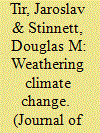| Srl | Item |
| 1 |
ID:
080284


|
|
|
| 2 |
ID:
096898


|
|
|
|
|
| Publication |
2010.
|
| Summary/Abstract |
Central Asia's Soviet past continues to haunt the five successor sovereign states with water, a contentious issue. Although fundamental to survival and livelihood, regional cooperation over the precious resource remains a patchwork of short-term stop-loss agreements at best and an exercise in "frameworks without content" at worst. This article seeks to explain why this is so, based on a theoretical position derived from hydro-political discourse. The eclectic explanations include the hydro-hegemonic void created by the removal of Soviet authoritarianism; the securitization of the hydro-political complex in Central Asia; unilateral and bilateral substitutes for multilateral water resource cooperation; and the ineffectiveness of international law - all of which contribute to the impasse over water cooperation.
|
|
|
|
|
|
|
|
|
|
|
|
|
|
|
|
| 3 |
ID:
083644


|
|
|
| 4 |
ID:
139068


|
|
|
| 5 |
ID:
110815


|
|
|
|
|
| Publication |
2012.
|
| Summary/Abstract |
Although the subject remains contested, some have speculated that climate change could jeopardize international security. Climate change is likely to alter the runoff of many rivers due to changes in precipitation patterns. At the same time, climate change will likely increase the demand for river water, due to more frequent droughts and greater stress being placed on other sources of water. The resulting strain on transboundary rivers could contribute to international tensions and increase the risk of military conflict. This study nevertheless notes that the propensity for conflicts over water to escalate depends on whether the river in question is governed by a formal agreement. More specifically, the article argues that the ability of river treaties to adapt to the increase in water stress resulting from climate change will depend on their institutional design. It focuses on four specific institutional features: provisions for joint monitoring, conflict resolution, treaty enforcement, and the delegation of authority to intergovernmental organizations. Treaties that contain more of these features are expected to better manage conflicts caused by water stress. This expectation is tested by analyzing historical data on water availability and the occurrence of militarized conflict between signatories of river treaties, 1950-2000. The empirical results reveal that water scarcity does increase the risk of military conflict, but that this risk is offset by institutionalized agreements. These results provide evidence, albeit indirect, that the presence of international institutions can be an important means of adapting to the security consequences of climate change by playing an intervening role between climate change and international conflict.
|
|
|
|
|
|
|
|
|
|
|
|
|
|
|
|